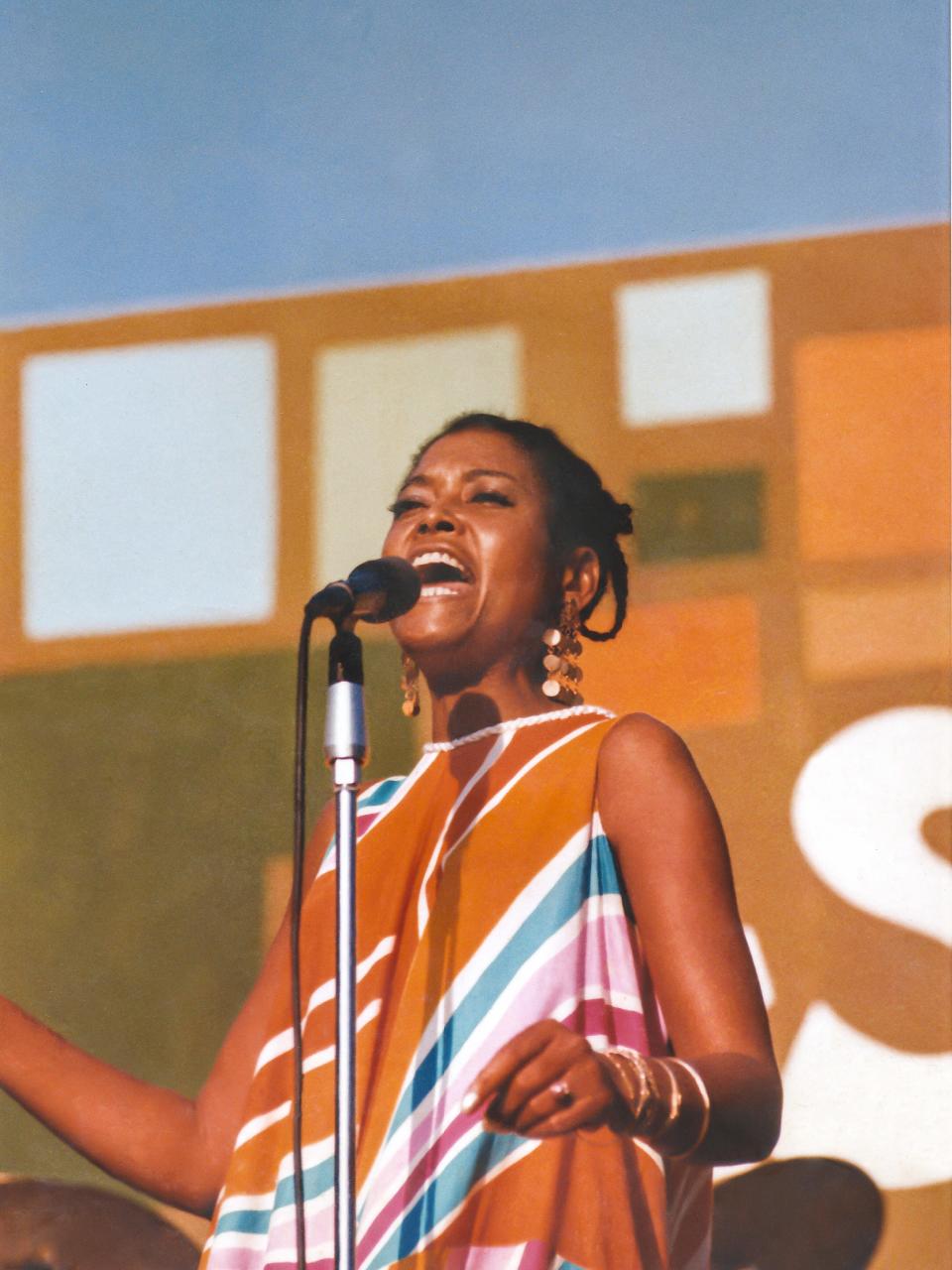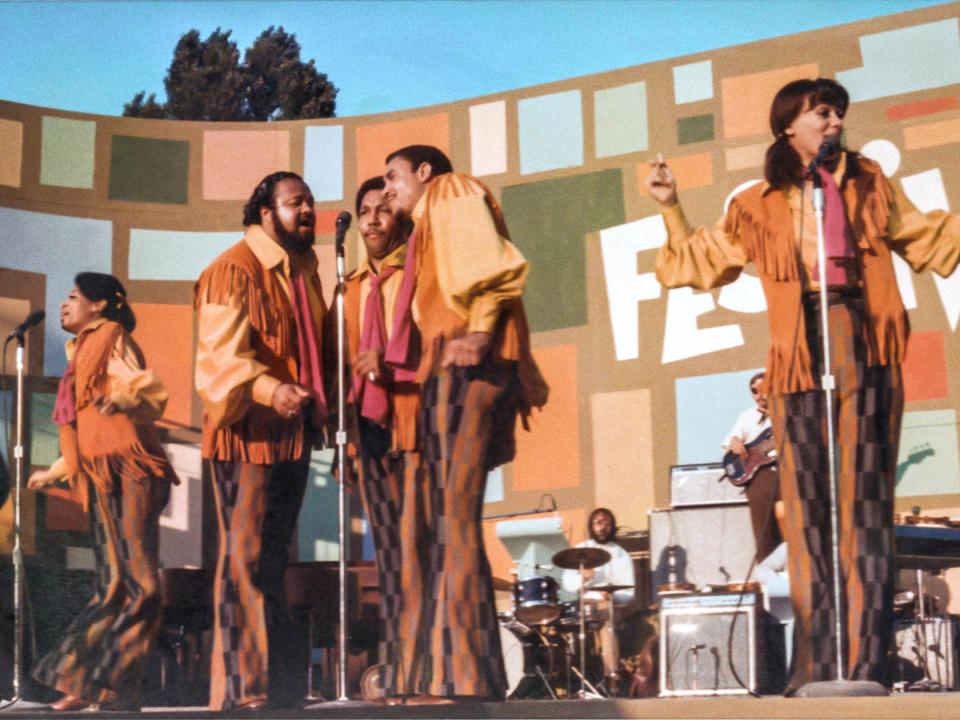In 1969, Woodstock overshadowed a groundbreaking Harlem music festival. Questlove's 'Summer of Soul' rescues it from the forgotten pages of history.

"Summer of Soul," a new film directed by Questlove, hit theaters and Hulu on July 2.
The movie centers on the Harlem Cultural Festival, the forgotten "Black Woodstock" of 1969.
Questlove didn't even know it existed before he was shown footage of the music event.
Hulu's "Summer of Soul" has all the trappings of a Questlove film, starting in the first five minutes of the documentary.
Those opening moments show an energetic 19-year-old Stevie Wonder, dressed in a snazzy brown suit and mustard-colored shirt, beating tom tom drums, hi-hats, and cymbals at 1969's Harlem Cultural Festival.
It was a conscious decision not to simply show footage of Wonder performing his usual wizardry at the keyboard, according to The Roots drummer and filmmaker Ahmir "Questlove" Thompson, who directed the film. Opening on this moment highlights something many may not have known about Wonder's artistry, setting the stage for a film that serves as a vital education in Black music history in the span of 117 minutes.
"I figured this was the best way for me to crash land into your lives as the director without it really being about me," Questlove told Insider of the film's introduction during a virtual press conference ahead of its July 2 release. "We haven't seen Stevie Wonder in this light as a drummer. That was the perfect beginning."
'Summer of Soul' centers on the Harlem Cultural Festival
As depicted in the documentary, in 1969, New York City's Parks Department hired local entertainer and connector Tony Lawrence to organize and promote summer programming.
The resulting festival lineup was a who's who of music, with a series of free concerts dominating Sunday afternoons from June to August in Harlem's Mount Morris Park. Long before Coachella, Afropunk, and Rolling Loud, the Harlem Cultural Festival delivered must-see performances by Gladys Knight & The Pips, Sly & The Family Stone, Eddie Ruffin, Mahalia Jackson, The Staple Singers, and Ray Barretto.
It was also unapologetically Black, from the fashion to the hairstyles to the vibrant activism.

Coming on the heels of the Civil Rights Movement, the Vietnam War protests, and the assassinations of Malcolm X and Martin Luther King Jr. in 1965 and 1968, respectively, the concert featured politically active artists, including Abbey Lincoln & Max Roach, Hugh Masekela, and Nina Simone.
The documentary features a particularly searing clip that's emblematic of the festival, where the incomparable Simone asks a sea of rapt faces, "Are you ready, Black people? Are you really ready? Ready to do what is necessary? To do what is necessary to do?" The crowd collectively screams, "Yeah!" Music from Simone, Masekela, Lincoln, Roach, and others became the soundtrack for political unrest.
While the festival entertained, moved, and ministered to a total of 300,000 people, it was overshadowed by Woodstock, which happened 100 miles away that same summer in Bethel, New York. What was a huge cultural moment in music history practically faded from collective memory.
Even Questlove, the ultimate soul music fan, didn't know this piece of Black music history existed.
"I inadvertently saw the footage back when The Roots first went to Tokyo in 1997. And my translator for that tour, who knew I was a soul fan, took me to the Soul Train Café," he told reporters. "Unbeknownst to me, I watched two minutes of Sly & The Family Stone's performance."
He continued: "I didn't know I was watching the Harlem Cultural Festival. I just assumed that all festivals in the '60s were from Europe, because America really didn't have that culture yet."
'Summer of Soul' was crafted from hours of original video footage of the festival - but it's only a small portion of what exists on film
Filmmaker and TV veteran Hal Tulchin captured 40 hours worth of performances, featuring a blend of soul music, salsa, and free jazz, but Questlove said only 10 to 15 percent of that treasure made it into the film.
Tulchin shot the historic event on video with hopes of selling it to TV, but there weren't any takers. He gave up around 1978 and the film canisters lived in a dry room - in pristine condition - in Tulchin's basement until his death four years ago. Then, Hollywood producers David Dinerstein and Robert Fyvolent, who'd approached Tulchin about his shelved footage in 2006, asked Questlove to direct what would become "Summer of Soul (…Or, When the Revolution Could Not Be Televised)."

He was hesitant. Out of all of the Philadelphia son's creative projects - he's an author, podcaster, and Jimmy Fallon's "Late Night" musical director - this one made him nervous. Why? Because artists can be neurotic, "living inside our heads," he said. The Roots frontman also said he's more comfortable behind the invisible shield between him and his audience. Or so he thought.
After wrapping "Summer of Soul," the beloved drummer admitted that spearheading the film helped him "develop as a human" and respect the power of editing.
The first cut of "Summer of Soul's" was almost four hours long. But it had to be trimmed to a succinct two hours to "hit you in the gut." It cleverly weaves performances with news coverage of Apollo 11 landing on the moon and interviews with festival-goers, musicians, and activists, like Marilyn McCoo and Billy Davis Jr. (of the 5th Dimension); Denise Oliver-Velez (The Young Lords Party); Cyril "Bullwhip" Innis Jr. (Black Panther Party) and Rev. Jesse Jackson.
The film earned the Grand Jury Prize and the Audience Award at 2021's Sundance Film Festival, so don't expect this to be Questlove's only directorial foray. "This is not my last rodeo with telling our stories," he said. "If anything, I'm more obsessed now more than ever to make sure that history is correct."
"Summer of Soul" is now in theaters and streaming on Hulu.
Read the original article on Insider
